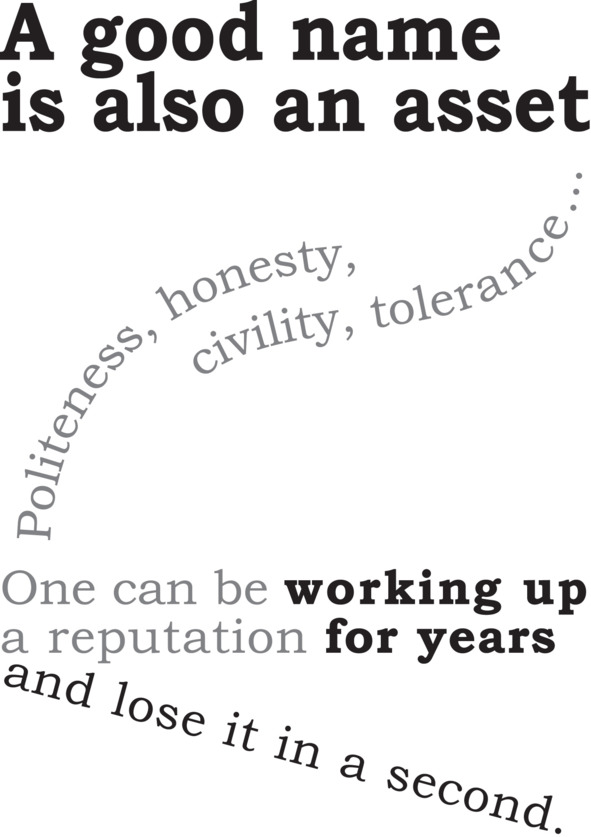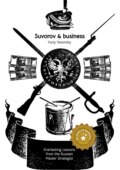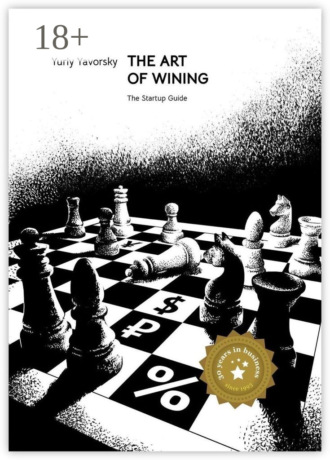
Yury Yavorsky
The Art of Winning. The Startup Guide
Translator Irina Nikitina
Illustrator Vitalij Blohin
Project manager Alexey Perevedentsev
© Yury Yavorsky, 2024
ISBN 978-5-4485-6953-1
Created with Ridero smart publishing system
First published in 2017.
All rights reserved. No part of this book may be reproduced in any form or by any means, including posting on the Internet and in corporate networks, for private and public use without a written permission of the copyright owner.
TO MY SONS
Unless you reach at least a dead end in the direction you have taken,
it will always seem like a tunnel!
Y&Y
To an aspiring entrepreneur
Recipes for success are innumerable. But it is not my intention to try and convince the reader that my speculations and conclusions based on personal experience (which is, by the way, one of those things that money cannot buy) are bound to work in any situation.
What I do know is that the most difficult thing is to be honest with yourself. This is why everyone, who is thinking about becoming an entrepreneur, should not look inside their wallet, but rather – inside themselves.

Start-up money is not the most important thing in business
An ear for music, a sense of rhythm, inner musicality – such things are not naturally given to everyone. Nevertheless, a huge number of kids enter music schools every year: their parents want them to become musicians.
After that the selection process begins: the first to drop out are those who are not patient and hardworking enough; some skip classes, others break down and quit; the next to leave are those without a musical talent; and finally – those who cannot meet internal competition. Very few actually reach the finish line – the most talented, interested and persevering. The same is true about business.
The most challenging question for me was this: do I want to become an entrepreneur or build a career of a top manager?
Ask yourself, why do you want to become an entrepreneur? What drives you – desire to earn a lot of money or to prove something to someone? Such goals are not just false, but also extremely risky. The eagerness to earn a lot of money, preferably quickly, is more treacherous than gambling. Substituting the strive for self-fulfillment with the trivial intent of becoming rich can play a low-down trick on a person. In this situation an aspiring entrepreneur risks losing everything and first of all – their time and confidence in their own abilities.

Ideally, the money stimulus would be secondary. It emerges and gains importance only after the actual results of entrepreneurship are seen: the hairstyles that the clients of your private salon are happy with; the scones in your family bakery, for which people line up every morning; the design of an apartment that you decorated with your own hands and that you are not ashamed to show to a most fastidious customer.
It is only when the market starts to recognize you and pay you back, that the money stimulus starts working as a motivation to expand your business. Profits and revenue are only the future criteria of success. As soon as you get your first results, close your first deal, complete the design of your first technological or manufacturing process, sell your first goods, you will turn that process into a continuously functioning profitable business.

– Business case —
…In 1994 I met an entrepreneur who opened a butter packaging business. She was working at a plant producing butter in huge pieces, where once she witnessed a sharp and unpleasant conversation between one of her superiors and a customer. The client was begging them to sell him only a part of a large chunk of butter, and was ready to pay the price of the entire piece, but the manager gave him a flat “no”, since the plant had no equipment to cut the big piece in two. Then the future entrepreneur called her husband and together with the client they cut the huge chunk of butter (which had already been bought by the non-local client) by hand, whereupon each of them took their half. The next day a butter packaging business was born in the city.
At that time this seemingly simple business – butter packaging – started developing faster than the Internet. First butter was pre-packed by hand, and then special equipment was bought. After a while they started pre-packing butter not only for shops, restaurants, and tourist kits, but also for export.

Later I watched a number of similar businesses develop in different cities across Russia: packaging of coffee and tea, spaghetti and dumplings, sugar and pepper. Think about it: we always buy prepacked fruit and vegetables more eagerly, even though they are more expensive. So, why not prepack nuts and raisins, and do it like nobody else has done so far? Entrepreneurs in Turkey, Jordan, China and other countries make good money on packaging. And there is always place for new brands.
– Business case —
…An English businessman offered an old coffee packaging line and a 50% share in his business to a former track-and-field athlete from Russia. The Englishman had been trading large batches of coffee for years, but in order to find a way into the Russian market he needed a partner. Our protagonist accepted the offer: no need to invest any money, nothing else required but a good name, decency and a capacity for work. Having received the first batch of coffee from his English partner, the burgeoning entrepreneur packed it slowly and carefully, thoroughly exploring the subject. After that he visited similar enterprises abroad, familiarized himself with the technology. After about fifteen years of hard work, studying the basics of business and refinement of the manufacturing processes, the company of this successful entrepreneur has become one of the biggest in Russia with the staff of over 300 people.
Unfortunately, in many cases a start-up ends in a failure. Opening a new business is an endeavor taken up by entrepreneurs, already successful in other areas, as well as top managers and common people, who know nothing about the basics of business. The reason is usually the same – the wish to earn money. And yet, I repeat: money is secondary.
Start a business in an area that you are familiar with, so that you will not have to build your competence from scratch, but as an addition to what you already know.
Remember: you should not only know a lot about what you want to do, but also be very passionate about it. You have decided to open a restaurant, but you do not know a dozen different fried egg recipes and do not constantly effuse about it talking to your friends? Better not even start.
You should sincerely love your first restaurant, small cybercafé, massage parlor or bakery.
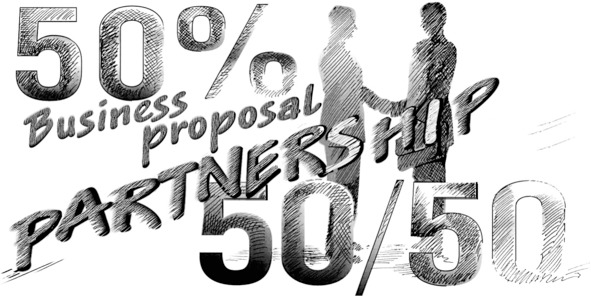
Naturally, resources are an important aspect for building a business, and at times they can be the backbone of the technological process you are creating, but the crucial things for a start are your willingness and your skills.
– Business case —
…Once my foreign guests and I went to a restaurant called “Vitalich”. I had no doubts that my international colleagues would enjoy the cuisine offered at this restaurant, quite popular in our city. But how surprised all of us were, when we saw the owner himself come out not just to greet us, but also to give us a huge dish of aspic from the meat of a wild deer that he had hunted himself! The guests were fascinated by the pile of transparent jelly cubes. It was delicious!
I vividly remember how Segey Ruban started his business, how scrupulously he selected his future dishes, trained the cooks, created the designs, thus spurring the restaurant culture in our city, as they say. And today, listening to him as he talks about ancient Slavic recipes, or explains how a certain type of restaurant or café should be arranged, one can see that he did not become a restaurateur solely for the sake of money. First and foremost, it is something he loves.
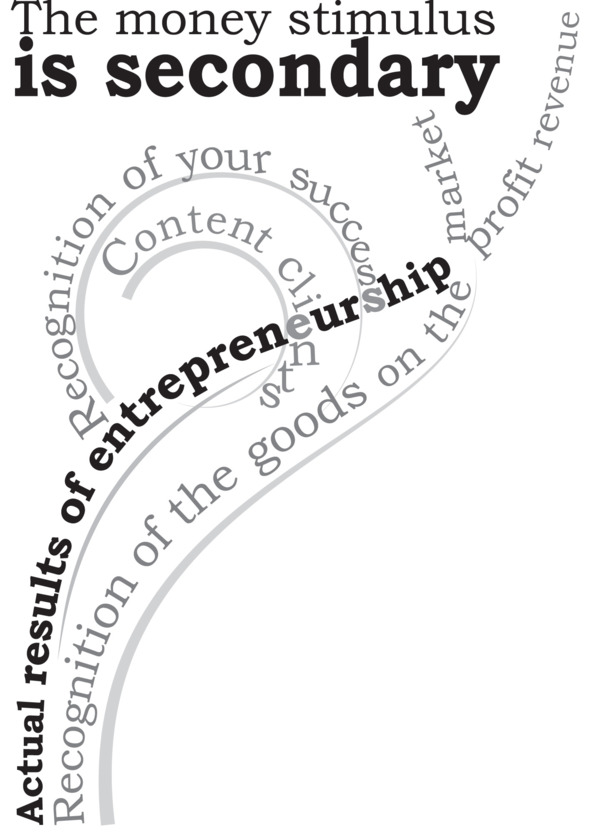
When at the beginning of the 90s I took up entrepreneurship, there was one thing I knew for sure – I did not want to be a seller. My teenage dream was to design and create modern cars. I was driven by the desire to give clients what they needed so badly: to equip the car with a hatch, power windows, and air-conditioning, to upgrade the passenger compartment with real leather of any color, and so on. And we designed tuned cars, unimaginable at the time, we experimented with various disks and tires, participated in summer and winter car and go-kart races, lost and won, searched and found new solutions for the development of the growing demand for non-standard cars.
I did not only strive to earn money, the most important thing for me was self-fulfillment, becoming the best at car tuning first in my own city, and then – in Russia. I am sure that any aspiring entrepreneur must try to make their business better than everyone else’s, set the goal of looking for any internal possibilities to make their dressmaker’s, hairdresser’s, their bakery, restaurant or printing house the best of the best.
The primary capital is a concept created by theoretical economists. In reality what is important is the subject, around which the future business will be built, the knowledge, the experience, and the desire to become the best.
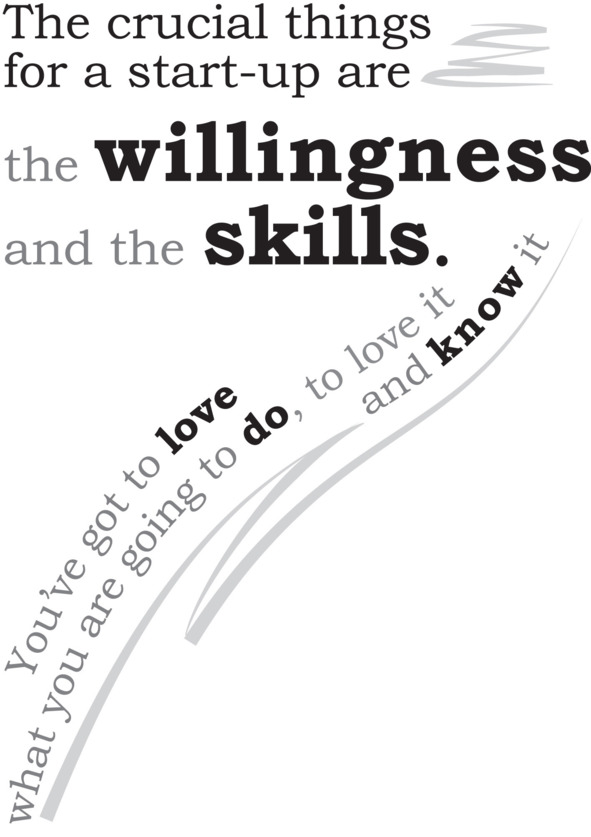
Today, after twenty years of being an entrepreneur, I can state with absolute certainty that those who started their business relying on their competence and natural talent, those who have kept up their reputation are still running their business successfully; as for those who bit off fat pieces of former Soviet monopolies and enterprises, they are not running a business, but rather still trying to find out who is right and who is to blame for the loss of the great potential the Soviet Union had. However, when it comes to searching for the truth, this argument has become completely useless by now, since for the Russian economy it is nothing but history.
– Business case —
…It was the beginning of the turbulent 90s – the years following the collapse of the Soviet Union. I was on a business trip to the city of Lvov in Ukraine. I took the set of brake cylinders for Volga passenger cars, which I had bought for 10 rubles in my native Nizhny Novgorod where they were produced, and went to the market (for the first time in my life) to sell them. I felt very uncomfortable arranging the cylinders at my feet and starting to call the customers. Fortunately, my intuition had told me to stand next to the man, who was selling brake cylinders too. After a while he asked me:
“How much are your cylinders?”
“Eighty”, I said.
“Will you sell them to me for sixty?”
I was overwhelmed with joy, because he was offering six times the price of the cylinders, and yet the inner voice of a burgeoning entrepreneur started resisting and I suggested agreeing on 70 rubles. He accepted, took out the money and started counting:
“Seventy – one, seventy – two, seventy – three…”
Six times seventy! In the end I sold my brake cylinders for 420 rubles – 42 times their price.
Sometimes your first success is the result of good fortune.

I still have some marketing research charts from the early 90s: one of the tables encompasses 170 enterprises that were my rivals at the time in one and the same city. The competition was ferocious: no chambers of commerce and industry, no commercial or mediation tribunals, no competition regulators. Banks were providing loans at an interest rate of 400 percent a year, and cash was carried around in plastic bags. There were no ATMs, no Internet, no mobile services, and the only thing that was encouraging me was love for what I was doing.

Negotiating the terms with the client, convincing them that for a decent price you can produce better products, thoroughly checking the quality after each and every one of your employees, scrupulously following your promises – because of all that I managed to make my first repair shops and workshops more well-known than the similar enterprises of my numerous competitors.
The result cannot be reached unless there is a goal to reach it. One cannot become an entrepreneur unless he or she sets the goal of becoming one.
Being the best is the primary task that is not always accomplishable, but it is something to which anyone who wants to become an entrepreneur should aspire.
I would like to talk separately about managers and top managers. It is quite common for former managers who have studied the subject while working for their employer to try and open their own business. Very often they simply start copying what they have been doing up to that point. Can this be called entrepreneurship? As far as I am concerned, it is nothing but stealing. It is impossible to build a similar business of your own relying on stolen intellectual property. “Thou shalt not steal”, so do not steal. Instead, start your own business, the idea might be similar, but it should be your own.
Try to create, not to copy
By the way, you will come across people who will try to steal your ideas, copy your design details or the recipes of your popular dishes, your engineering solutions or your technological process created by years of burning midnight oil and depriving yourself of rest. Do not waste much time on dealing with these vultures. Patents, lawyers and discretion – that is all good and useful, but the most important thing is to keep moving, developing, so that your competitors will not be able to keep up and copy even the existing things, and you will always be one step ahead. It is quite possible that someone who steals your idea will not know how to make use of it, how to develop it, and it will bring them neither luck nor profit.
If you thought of the idea that has been stolen from you, you will think of another one. True happiness of an entrepreneur lies in the work process itself, not just in its result.

One of a hundred
Business is an art.
In order to succeed as an entrepreneur, one needs talent similar in its intensity and richness to that of a military man, a sportsman or a musician. But the talent of an entrepreneur is peculiar in that it is indiscriminate: there is no area of life where it would be useless. It is equally necessary in culture and sports, economy and politics, education and finance.
According to scientists, only 4 percent of the global population – 4 people out of a hundred – are particularly gifted and talented. They might not have the highest grades in their high school diplomas, they may even drop out of the university, but they have a gut instinct for success, an intuition, healthy adventurism, bravery of a pathbreaker and no fear of the unknown. Such people never lose heart, and misfortunes just make them more persistent in following their goals. That being said, the same researchers claim that only 1 of the four has the gift of a real entrepreneur.

I am not an expert in that field and I myself would gladly subject these numbers to a careful verification. But remember your final year at high school or your groupmates at university: how many of your peers are successful or talented in some way? You will see that the answer is – no more than 4 percent, and only one of them is truly talented and successful as an entrepreneur. Just recollect your classmates and groupmates!
Why am I putting such an emphasis on these calculations? Because I am convinced that certain regularities are not only found in mathematics. One can also see them in entrepreneurs’ training – a branch of study that has already emerged and is developing rapidly. In a city with a population of 100,000 people, only a 1,000 can become truly talented entrepreneurs.
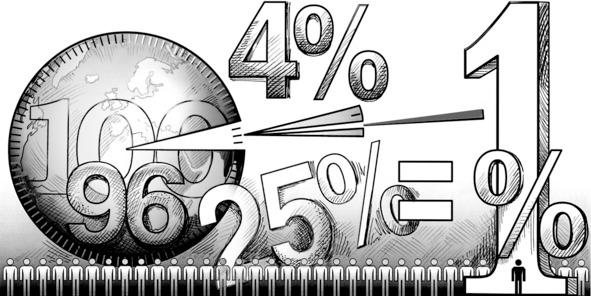
It is not a secret that small and medium-sized enterprises on average provide up to fifty jobs. That means that a city with a population of a million people should have no less than 10,000 successfully operating entrepreneurs able to create up to 500,000 jobs, and thus guarantee employment for the entire working-age population. In Russia however such calculations are subject to correction because of red tape and corruption.
Evaluate yourself and your abilities: are you ready to walk the path of uncertainty and ambiguity all on your own? Are you ready to limit your own freedom by a conscious decision and to face legal restrictions? Are you ready to move forward through a series of wins and losses? Are you ready for the changes in your social circle and a possible loss of close friends who are not going to follow you into the business world? Shortly speaking, I am asking once again: are you ambitious enough, competitive enough, do you have the desire to become the best in your field?
One who is indifferent will never become an entrepreneur. Business success is rooted in the non-material, so those who have achieved some success, bought a house in a prestigious part of the city, gained a certain status, a reputation and stopped there can also be referred to as “the indifferent”.
If you are basically indifferent to the work, if you feel more comfortable following orders and receiving instructions, rather than giving them, if you prefer to limit yourself to a small number of tasks and responsibilities, you are unlikely to become a real entrepreneur. Even being a leader is not enough. Yes, an entrepreneur is always a leader, but not every leader can become an entrepreneur.
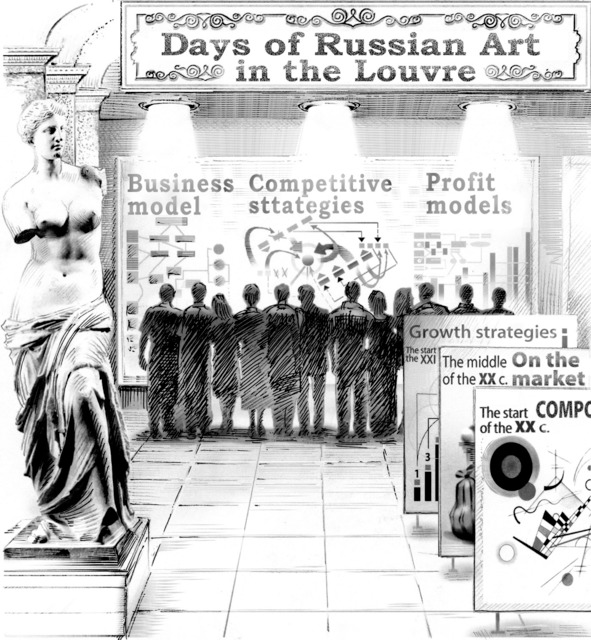
Studying various businesses, including foreign ones, I have repeatedly found that the profits of many entrepreneurs do not surpass the salaries of managers in big state or private companies. The question is: why would you struggle, take risks, deprive yourself of sleep. What for? Not everyone would be ready to answer that question honestly, but I know the secret – an entrepreneur is always driven by ambition. It is better to be the first and get less money, than the second and earn a lot – this is the principle that guides those who decide to open their own business. As for common leaders, they try to work within the limits of their competence and follow particular rules.
– Business case —
…When I was already an accomplished entrepreneur, I was offered a job in a big corporation. I accepted the proposal, because such experience was interesting to me as an opportunity for self-fulfillment and self-examination: am I ready to work under someone else’s control and within the established rules? I was very curious to find myself inside a huge corporative mechanism, to understand the levels of freedom and responsibility of a top manager.
I instantly saw a huge number of disadvantages in this inflexible and conservative system. I felt highly uncomfortable: it is sad to see how long it takes for decisions to be made, how scheming and artificial obstacles stand in the way of effective and useful suggestions. However, at the same time I saw dozens of leaders (managers and top managers) who felt quite at home in this environment.
We spoke different languages: I wanted to gain profit from every process, suggested changing many things; as for them, they acted strictly within the margins of their responsibilities, until they received new tasks from their executives. The most important thing was to fulfil the orders accurately and on time, otherwise they were guided by the principles “do no harm”, “do not hurry to follow the initial instructions, they might be cancelled by the following ones”, “do not jump the gun”.
I realized that the environment of corporate business was not for me. On the plus side it consolidated my belief in that being an independent entrepreneur was more comfortable for me, than being an executive in a huge corporation.
Then again, it is not only entrepreneurs who try their hand at occupying various positions in medium, large and gigantic corporations. Very often it is the other way around: successful top managers decide to become entrepreneurs. As a rule, at the beginning those are offshoot-businesses through which former senior executives either start supplying materials and equipment to their former employer, or become mediators in the provision of services (or manufactured goods) for that corporation. It is quite clear why it happens this way: the clients are already there, the suppliers are familiar, part of the employees are already “recruited”.

Under certain conditions, this process can grow into a strong business. But it is not uncommon for such an entrepreneur to become a king for a day. Everything depends only on themselves. If a former senior executive willing to become a real entrepreneur identified an actual market need instead of using connections based on corruption or criminal schemes, it means that he or she has chosen the right path. However, a business keeps developing only if from the very beginning its future owner starts investing in self-education and personnel training, equipment and development of business processes. Otherwise any decisions will prove useless.
At the same time, speaking about top managers, it is important to remember that when leading executives in a business want to leave and create their own company, there is a downside to it.
Resignation of a leading top manager is a heavy blow for an entrepreneur: it always happens at the worst time, there is never a proper substitute, and no way to keep the clients. Moreover, suppliers may not be guided by the established good relations: “business is business – nothing personal”.
It immediately becomes evident that trust is good, but not too much trust: a full delegation of authority merely helped the treachery of the manager to emerge and to grow. The owner should have prepared a substitute, but were afraid that the employee would be offended by the distrust, they should have checked more often, but were afraid to spoil the relationship with excessive suspiciousness – this is something that almost every entrepreneur goes through.
Top managers betray you, steal your ideas, copy your know-hows, and take valuable materials or money. And there is no recipe to avoid such situations altogether, the only way to protect yourself is through a complex of solutions, namely: constant work with the employees, a system of contracts, inner monitoring of the problems in your own business. And this is by no means a complete list of preventive measures and precautions.
– Business case —
…At the age of seventeen I took part-time jobs like most of my peers – some as construction workers, others were harvesting crops or unloading freight trains. I prepared mortar and brought it to the bricklayer: first one, then two, in a week I was already helping three bricklayers at once. I wanted to earn some money and was strong enough.
And then suddenly I heard that a construction crew was put together to work at a roofing plant in the city of Odessa. I signed up. On the very first day I got bored at my work site: my only responsibility was to occasionally empty a bucket of white oily liquid called “kagalin” into a vessel through which the tape of the future roofing roll crept. Then I decided that I could simultaneously master another operation and soon started working two shifts in a row. Only a week later I was able to perform fifteen operations at a conveyor belt 100—150 meters long.
A month passed by. By then, apart from the two shifts, I spent several hours a day unloading train cars with roofing. For each type of work I got a mark in my time-sheet. I was already counting how much I had earned. And then I went to get my paycheck, and saw that only part of the money was indicated in the account book. For three days the headsmen of the two shifts kept sending me to each other, until I finally gave up. I went to the train station, tired and disappointed. But I did have 200 rubles (out of the 450 that I had earned) in my pocket, so I decided to stop by the well-known Odessa market “Privoz” and buy some presents for my family. And there I fell for a simple conmen’s trick: a planted package (which at first glance contained enough money to buy a car), a scuffle, a fuss, 200 rubles covered in blood and given away in a sort of slumber, and the so-called “dummy” – a wad of paper with only two real bills in my hands. How angry I was at Odessa and its “Privoz”! And how grateful I was to it later, when I became an entrepreneur for showing me how crooked and unjust people could be, and letting me see that such incidents could never break me.
A lot of things in business are based on trust, and the stronger you get, the more trust you are going to need. This goes both for the amounts of money and the contract responsibilities: at times entrepreneurs give each other large sums of money without any warrant relying solely on their word.
Never try to push your way in business through cheating or manipulations. One can be working up a reputation for years and lose it in a second.
As a rule, an entrepreneur is stronger than the majority of common people surrounding him – those who are envious of his or her ability to arrange a business. Many of them dream about trying their hand at entrepreneurship. That is why is it so important to be as decent and civil as possible not just with your business colleagues, but with everyone around you.
– Business case —
…At the beginning of his entrepreneur’s career a colleague of mine (he is still a prominent businessman) asked me to do him an urgent favor and to lend him a set of leather seats for a tuned car that were produced at my shops. And I did, taking his word that he would pay me back.
When the time was up, instead of money he offered me a barter deal (an exchange of goods was common in the 90s) – a five-speed gear-box. Although I was clearly losing money, a bird in the hand is better, so I had to accept the offer. One of his employees brought the gear-box and we put it in the storehouse. After a while we installed it in one of our tuned cars. How disappointed we were to find out that all the gears inside the box were old and it was not even assembled correctly. I had been paid back with a “dummy” once again, but this time I knew who had done it and when. I approached the colleague with a request to exchange it, but received a square refusal: “You should have checked at once.” But how could I have checked without installing it in a car? However, he was not going to listen to my reasoning.
Years passed by. That businessman deceived everyone around him and never gained respect. Today he has the worst reputation among entrepreneurs whom I know in our city and our region. I am sure that in the end he will pay for having treated his business colleagues so unfairly.
If you belong to the “magical minority” of true entrepreneurs, be as polite as possible with those who are dependent on you, and the community will grow more tolerant towards you. We must treat others the way we want them to treat us.
